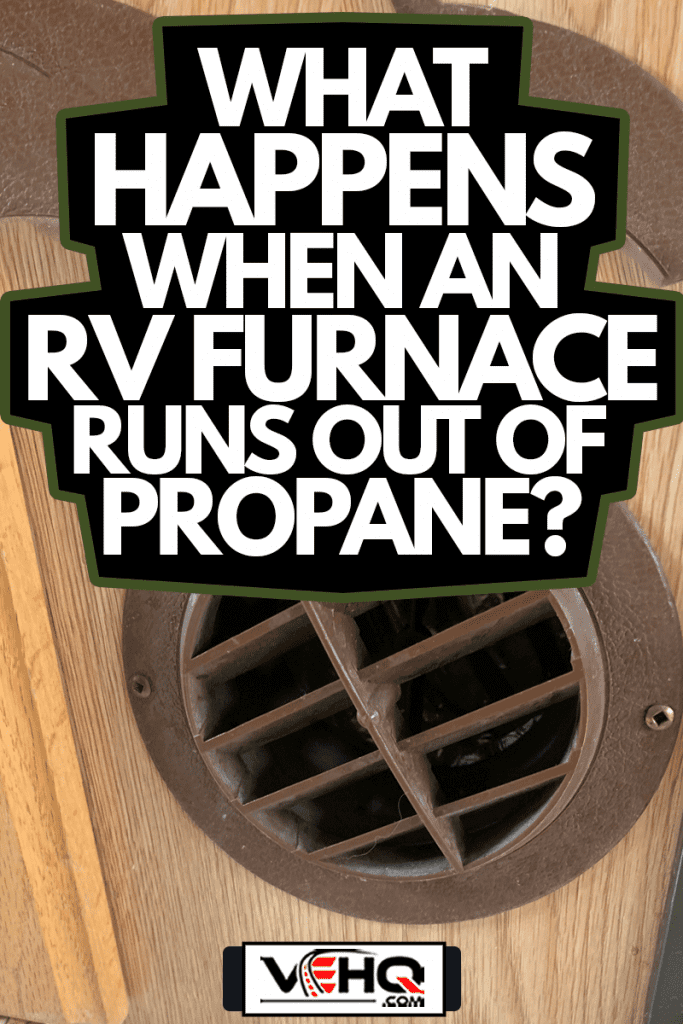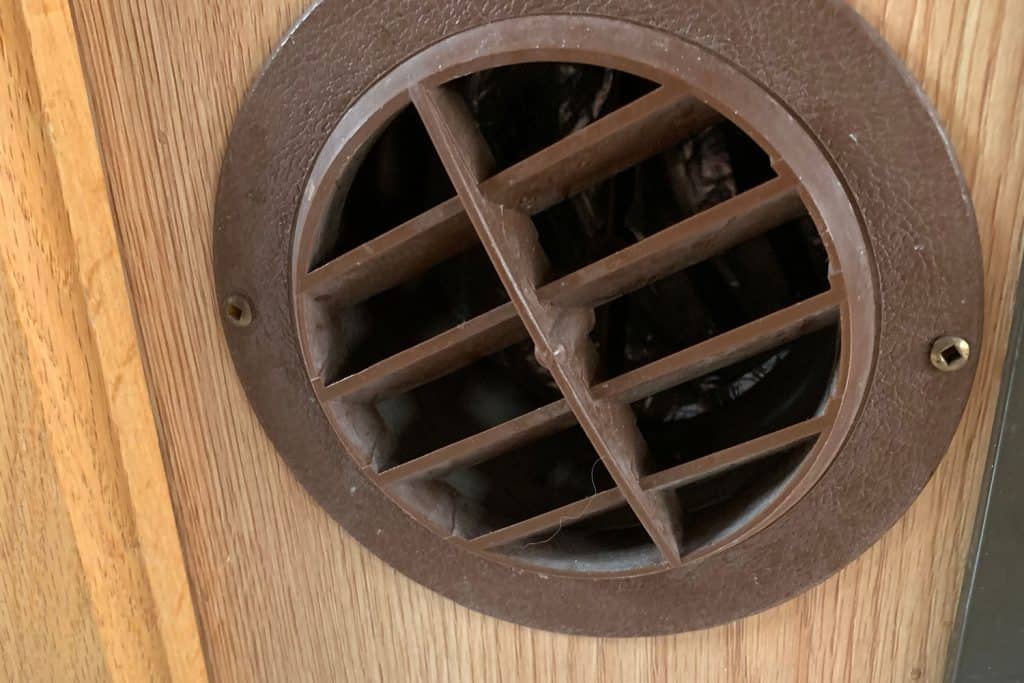Staying warm is one of the most essential things that determine your comfort level when you're on the move. This is the primary purpose of your RV furnace. It runs on propane and produces heat to ensure that no matter what weather conditions you brave, your RV stays nice and toasty. But what happens when it runs out of propane? We've scoured the most reliable sources to give you the answer.
When an RV furnace runs out of propane, the tank pressure will continue to drop until it stops working entirely. Letting the gas run empty is hazardous, as it can lead to leaks, airlocks, rust buildup in the tank, and malfunctioning brake lights. It's best to keep your propane tank filled to protect your RV from these problems.
There's a lot more to explore when it comes to this issue. Keep reading to find out the dangers of running out of propane, how to know if your RV is out of propane, how to reset it when it runs out, and other important information.

What are the consequences of running out of propane?
It's understandable to forget to fill up your tank, especially when you're on the road. But paying extra attention to this can be quite beneficial, as it can prevent future problems and complications. Take a look at the dangers of running out of propane:
1. Leaks
When the furnace sits empty for a long time, it starts to malfunction. Refilling your tank after this length of time can then cause leakage. Leaks can also occur during refilling when you leave a valve or gas line open after the propane runs out.
2. Airlocks
The furnace does not stop working immediately after the propane runs out. As it tries to continue to operate, pressure builds within the tank, leading to the formation of airlocks. These airlocks are difficult to remove and can be damaging to the mechanism of your furnace.
3. Rust build-up in the tank
Left empty, air and moisture can start to come into the tank and eventually lead to rust build-up which can damage the tank and weaken the odor of the propane. This is especially concerning because this strong odor is specifically added by manufacturers to help alert users of gas leaks. So if you have a rusty propane tank, you may not be able to smell gas leaks when they happen.
4. Malfunctioning brake lights
Brake lights in your RV may run on the gas supply, which means they'll immediately turn off once it runs out. This presents a major hazard on the road, and it's best not to drive when this happens.
How do you know if your RV is out of propane?
There are three ways you can check if your RV tank is out of propane. These methods vary in accuracy, so you can try each one to see which works best for you.
1. Hot Water Method
This is the simplest method here, and it's been tried and tested by other RV enthusiasts! All you need is a glass of water to perform this test. Follow the steps of the hot water method below:
- Get a glass of boiling hot or warm water.
- Pour the water over the tank.
- Feel for any temperature changes along the side of the tank.
The tank will go from feeling warm where there's no gas and feeling cool where there is. The point where you start to feel the difference in temperature indicates the level of propane left in your tank. So if it feels the same all the way through, it's likely that your tank is already empty.
2. Weight Method
For a more accurate estimation of your propane level, this technique is the ideal choice. You will need a calculator and a scale, however. Follow the steps of the weight method below:
- Remove your propane tank from your RV and set it on your scale.
- Write down its current weight.
- Subtract its current weight from that of its tare weight (the weight of an empty propane tank).
The number you get from the subtraction will provide an estimate of the weight left in your tank.
3. Gauge Method
The most accurate and hassle-free way to see if your RV tank is out of propane is to use a propane gas gauge. You can choose between a digital, analog, and inline gauge depending on your needs and budget.
A digital gauge may be best for those looking for accurate sensors, while an analog gauge provides a straightforward and affordable design. However, many RV enthusiasts go for inline gauges for their accuracy, durability, and reliability.
Check out this inline propane tank gauge on Amazon.
How do you reset an RV furnace after running out of propane?
If your furnace doesn't start immediately after you've refilled the propane on your tank, don't worry. Follow these steps to restart your RV furnace:
- Turn off the circuit breaker box.
- Turn off the furnace.
- If you have an older furnace, remove the access panel to the pilot light.
- Turn off the gas control valve (a round knob found at the top of wall furnaces and at the bottom of floor furnaces).
- Allow the gas to dissipate for 5 minutes.
- Turn the gas control valve back on.
- Use a lighter to ignite the pilot light.
- Turn the breaker back on, then turn the furnace back on as well.
Furnace still won't start? Check out this instructive guide on what to do if your RV furnace won't ignite.
How does an RV propane furnace work?
An RV propane furnace is a forced-air heater, meaning that it generates and forces hot air to blow through your RV whenever your thermostat indicates that the temperature inside your camper is too low.
While it runs on propane, your RV furnace still needs electricity to work. It uses propane to produce hot air and uses electricity to allow the blower motor to circulate heat.
The heating system of an RV furnace typically consists of the following:
- Thermostat: Keeps your RV at an ideal temperature.
- Blower motor: Circulates hot air throughout the RV.
- Intake and exhaust vents: Provides adequate ventilation.
- Ductwork: Delivers heat to different areas of the RV.
- Safety limit switch: Prevents the RV furnace from overheating.
- Sail swit: Detects airflow from the fan to determine when to ignite the propane.
- Circuit board+ Handles the operation of the furnace components.
An RV propane furnace is efficient and affordable. Not only does it keep your RV warm and cozy, but its ductwork also protects the pipes and tanks against freezing. It's a reliable heat source on the road since it's durable and easy to repair.
How long will my RV furnace run on propane?
The amount of propane your RV furnace uses depends on the size of the furnace. On average, an RV furnace will use up a gallon of propane with three hours of continuous use.
Find out more about this topic by reading this extensive article on how much propane an RV uses.
How can I heat my RV without propane?
While propane furnaces are generally reliable and inexpensive, the downside is that they can be noisy. They can also use up a lot of electricity and gallons of propane, especially in cold weather. In some cases, they may stop operating in extreme cold.
If propane furnaces are not for you, there is a wide variety of heating options for your RV! Here are three of the most popular types of heaters:
Space heaters
A portable space heater is perfect for anyone who wants a convenient and efficient heating solution. They're easy to set up, so they can heat up the interior of your RV quickly. Most space heaters also come in compact sizes, so you can store them away during hot weather.
Check out this portable space heater on Amazon.
Oil radiators
Oil radiators work just like and cost about as much as space heaters, but they're less prone to fires. They are also excellent at maintaining warmth in an RV for long periods of time. However, because they tend to stay warm longer, it also takes about half an hour for them to warm up and cool down.
Check out this oil radiator on Amazon.
Heat pumps
Heat pumps use electricity to warm up your RV. They're often compared to air conditioners since they operate the same way: they transfer heat from outside your RV to its interior.
Heat pumps are known for being energy-efficient; they can deliver twice as much heat as a space heater. However, they can be quite noisy. They're also more expensive than other heating options.
Check out this Bluetooth heat pump on Amazon.
In Closing

It's dangerous to let your RV furnace run out of propane. Make sure to check your level of propane using different techniques to avoid running into this issue. With your RV furnace in perfect working condition, you can keep cozy in your camper and enjoy your RV experience to the fullest.





Your brake lights have absolutely nothing to do with and are not operated by propane.
@diver165,
My thoughts exactly! Steve in TN